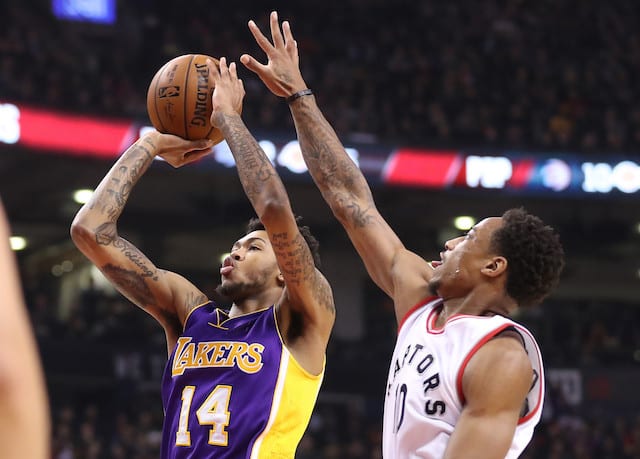Going into last season, the biggest decision facing the Los Angeles Lakers was how to balance playing time between their young core of players and the veterans the team had signed in the offseason. There was a perception that under head coach Byron Scott, the young players did not receive sufficient minutes and that Scott relied too heavily on older members of the team such as Roy Hibbert, Brandon Bass, Lou Williams, and, of course, Kobe Bryant.
When questioned about playing time for the young core, Scott’s answer was direct: Basketball is about winning, and the veterans gave us a better chance to do just that. Most observers felt that this was the wrong approach, that the Lakers were not going to win no matter what and the focus should be on developing the young players who represent a hopefully brighter future.
In the end, things did not work out well for Scott. He spent most of the year relying on players who would not even return this year (Bryant, Bass, and Hibbert), the team won only 17 games anyway, and he was fired after the season ended.
— Get 15% off everything in the Lakers Nation Store right now by using the promo code ‘Lakers’ —
The Lakers faced the very same decision when the current season began. The assumption was that Luke Walton, who is himself the youngest head coach in the NBA, would “get it” and make this season all about the young core, which expanded over the summer to include Brandon Ingram and Ivica Zubac. Combined with D’Angelo Russell, Julius Randle, Jordan Clarkson, Larry Nance, Jr., Anthony Brown (later cut), and Tarik Black, the Lakers had a promising young group, but after last season no one knew for sure the heights which any or all of these players are capable of reaching. That is why it was so important to ride the young core this season, to find out what the Lakers really have in their stable.
It has not worked out the way most people expected. Not a single member of the roster is averaging 30 minutes a game. Clarkson led the team in minutes played in 2015-16 but his minutes have dipped from 32 last year to 28 minutes per contest this season. Russell’s minutes have dropped from 28 last season to 26 this season. Most observers assumed the team would ride Russell and Clarkson hard this year, meaning they would average 35 minutes a game. After all, the Lakers bet heavily on Clarkson in the offseason with a lucrative contract extension, and there seemed to be a love fest between Walton and Russell the minute Walton was hired.
Randle is playing 28 minutes a night, the same as last year. Nance is playing slightly more this season but is still getting only 22 minutes a game. Even Black, who played very sparingly under Scott, is averaging only two minutes a game more than last year. Lately, although he played very well earlier, Walton is not playing Black at all even though he reportedly has recovered from a recent ankle injury.

Then there is Brandon Ingram. It seems like he is always on the court, but in truth, he is playing only 27 minutes a game, fewer than Russell averaged last year when it was perceived that Scott was holding him back.
It is tempting to compare the Lakers to the Minnesota Timberwolves, another team that has a strong young group. Their best young players, Andrew Wiggins, Karl-Anthony Towns, and Zach LaVine, are all averaging between 35 and 40 minutes of playing time per game. The result has been, at least individually, all three are having breakout seasons in which they are all averaging at least 20 points per game.
In fact, all five starters for Minnesota (including Gorgui Dieng and Ricky Rubio) are averaging over 30 minutes a game. The Timberwolves started the season very poorly, but no one questions the fact that by year’s end they will have far more wins than the Lakers.
This is the way it was supposed to be for Russell, Clarkson and Randle, but it never materialized. Instead, like Scott last year, Walton relies heavily on veterans Luol Deng and Timofey Mozgov, who replaced Hibbert and Bass, and holdovers Lou Williams and Nick Young. Presumably, he is doing so for the very same reason Scott preferred to rely on veterans: He believes it will lead to more victories. But is that a sound approach?

Williams and Young are playing much better this year than last, while Deng and Mozgov are a modest improvement over Hibbert and Bass. But does this really make a difference? After a promising start, where it appeared the team would win 30 plus games this year, the Lakers have lost 13 of their last 15 games and are tied for most losses in the NBA this year. They are currently projected to win around 25 games this season, which is precisely what the experts expected before the year began. This is a little better than last year, but it is not the improvement fans hoped for.
So the question remains: Is it better to feature the veterans to win 27 games, or ride the younger players harder even if it results in only 24 wins? Coaches are judged by their wins and losses, so it would be hard for Walton or any coach to take the route that leads to fewer wins. But after last season, which was dedicated almost entirely to giving Bryant a year-long going away party, most people really believed that this season would be all about the young players. With not a single one playing close to 30 minutes a night, it has not worked out the way most people thought.
Stated otherwise, Williams and Young have had strong seasons so far, but what does that mean and should fans really care? Wouldn’t it be far more significant if we could say at year’s end that Russell and Ingram had really strong seasons?
None of the young Lakers players has taken a leap this year comparable to the improvement shown by Wiggins, Towns, and LaVine. The one who comes closest is Randle, but upon careful review, even that is misleading. His rebounds are down from 10.3 to 8.6, while his scoring has risen from 11 points to a still modest 13 points per contest. He has had some great performances this season, like 25 points and 12 rebounds against the Jazz. But his pattern is to follow a strong game with a string of sub-par performances.
As for the rest of the young core, Brown was shockingly cut so the Lakers could find a spot on the roster for Metta World Peace; Zubac is not playing; Black is not playing at the moment; the minutes of Clarkson and Russell are surprisingly down; and Ingram is playing about the same number of minutes Russell played last season when many fans complained he was not playing enough.
In sum, the past two seasons the Lakers have paid lip service to the notion of going ‘all in” on the young core, but the statistics prove they did not follow through.
When fans watched the team’s recent loss to the Utah Jazz, and saw lots of Deng, Mozgov, Williams and Young in the fourth quarter, less of Russell, Randle, and Clarkson, and none of Black and Zubac, one has to wonder if Walton is merely following the same blueprint established last year by Scott. We still don’t know what the team has in its young core — they simply do not receive the heavy, sustained playing time that is needed to showcase what they are likely to become in the future. Thus, at this moment, the Lakers future remains unclear.






